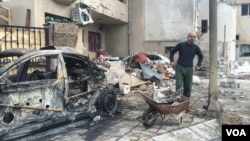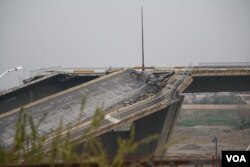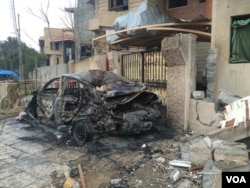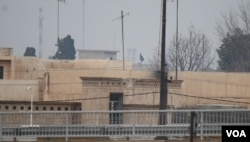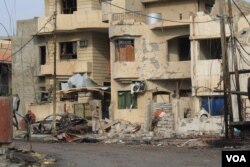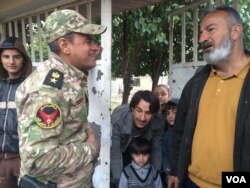Once this was an elegant residential street next to a small park and across from an imposing home belonging to the family of the governor of Mosul, Iraq. Nearby was a Turkish consulate, and the roads were freshly paved.
When Islamic State militants took over in 2014, they promised the local people — many of them business people, engineers and doctors — better governance, education, electricity and water. And despite the quiet wealth of this district, resentment of the local government ran deep.
"At first, they smiled at us," says Omar, a 31-year-old electrical engineer, on Thursday in the covered patio of his family home.
In the year that followed, however, IS became increasingly strict and then cruel, eventually brutalizing and robbing the people. And freedom from the extremists in battles this week came at a heavy price, says Omar.
"The militants forced us all to put our cars onto the streets. In the morning on Saturday there was an airstrike over there," he says, pointing to the hole in the street next to his neighbors' badly damaged house. "So they burned our cars so the planes couldn't see them anymore."
Next door, the neighbor sweeps up rubble and piles pieces of the broken home in the front yard.
Smoke from Omar's and others' burning cars permeated every crevice of nearby homes, says another neighbor, showing us a mortar that also fell in the yard. The empty park across the street had 16 trees before the fighting; a generator explosion sent hunks of metal across the street and three stories high that day, landing on the roof of his house.
"This was the nicest area in Mosul before IS came here," says Omar.
"See that house? IS kicked the family out," he adds, pointing across the street. "Over on that roof, they stationed snipers. "
Brutal battle ends brutal times
Around the corner on Thursday, Iraqi soldiers fired machine guns and rocket-propelled grenades into the next neighborhood, trying to hit an IS sniper.
"He keeps moving from place to place," says Captain Khalid Mustafa of the Iraqi Federal Police, on the rooftop of a building with a view of a still-waving IS flag. It's a relatively quiet day in western Mosul with rain grounding coalition airstrikes and Iraqi fighters holding back while the weather favors IS.
"IS takes advantage of days like this only for snipers," Mustafa adds. "They have no strategy."
On the street, some Iraqi soldiers crouch under the cover of houses, taking turns bursting into the intersection with guns blaring and loading RPGs. Others occupy rooftops, shooting from behind sandbags or holes in walls. Families venture out of their homes, but not much farther than the gates of the walled gardens so popular throughout Mosul.
While IS's fighting seems generally haphazard, with a barrage of bombs, mortars and gunfire hurled at Iraqi forces, their rule, according to residents, was methodical, using well-planned techniques to keep themselves as safe as possible and the people terrified.
"One of my neighbors called a police officer on the phone," says a businessman, who did not want to share his name for security reasons. IS has repeatedly threatened to kill families of people who speak to the Western press, and the man still has family in their areas.
"They shot him in the head and made a video," he continues. "Then they produced disks that showed him and six other local people being executed." The video, he says, was played in local mosques and militants distributed disks to passing cars in the streets.
Militants kept themselves safe, adds his 18-year-old son, by moving monthly.
"They would kick the family out and then when they were ready to move they would steal all the furniture," the son says. "Then the house would be used to store weapons."
Lucky ones
Houses in al-Josaq were favored by IS, as they were generally the largest and most luxurious. IS set up its press center here, leaving behind disk cases, tripods and other media equipment. Also nearby was the office that collected zakat, an obligatory payment to support charity under Islamic Law.
Unlike most Mosul neighborhoods, parents here say they could afford to store food and water ahead of the battle, which they expected to be far longer.
Still supplied for the foreseeable future, they say they don't anticipate fleeing their homes like so many others in Mosul. More than 30,000 people fled their homes since the operation to retake western Mosul began nearly two weeks ago, joining the nearly 200,000 people displaced by battles that started in October.
On Friday, thousands of people arrived at the newest refugee camp, which has completely filled its 4,000 tents since it opened Monday.
"Most of the people are exhausted when they arrive," Nader al-Tai, one of the Hammem Aleel camp managers, said Tuesday. "We will need more tents and we are trying to relocate as many people as possible to towns and cities."
Many families say that after months of soaring prices and restricted movements, weeks of battles and years of IS rule, they are without resources to move anywhere. Hunger drove them from their homes, despite the relative safety of remaining indoors during battle.
"We ran out of food two months ago," says Ahmed, 15, near a tent with his mother and sisters. "We had only tomato paste with warm water. We had no fuel and cooked over wood."
Remnants of IS
Outside Omar's home in al-Josaq, we hear men shouting as they pass by. Soldiers crowd around a man in an orange beard and a traditional robe, just arrested by federal police. They believe he was a high-ranking IS prison official.
People in the neighborhood reported him, says 1st Lt. Hassan Ali, the arresting officer. One soldier smacks the prisoner on the head with a pair of flip-flops and others curse at him and tauntingly call him "Daesh," an insulting expression in Arabic for IS that has been widely used since the group took over parts of Syria and Iraq in 2014.
"Some people in the neighborhood told us a stranger was in one of the houses," says Ali, surrounded by soldiers and journalists snapping pictures of the detainee. "We found him hiding in the basement."
Other IS fighters' bodies rot on the sidewalks, including one man who soldiers say was in charge of flying the armed drones over Iraqi forces in east Mosul. The drones have been notably absent in recent days.
Iraqi forces are searching homes in recently captured neighborhoods, but some families say militants who do not die in battle or fall back sometimes steal civilians' identifications to hide among the refugees. Iraqi and Kurdish peshmerga forces often compare lists of known IS militants with refugees' IDs before admitting men into camps.




